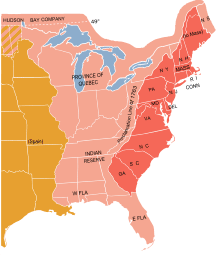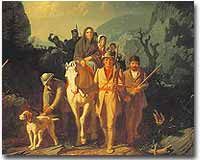Which Group of Colonists Believed That England Should Continue Governing the Colonies

The Declaration of Independence
Lesson Plan
The Royal Proclamation of 1763
- Why did the British want to confine their colonists to living on land east of the Appalachian Mountains?
- Why were the colonists resentful over not being able to expand west?
- What were the Native Americans' attitudes toward the colonists and the British and the colonists' attitudes toward Native Americans?

After Britain won the Seven Years' War and gained land in North America, it issued the Royal Proclamation of 1763, which prohibited American colonists from settling west of Appalachia.
After the French and Indian War, the Treaty of Paris was drawn up, officially ending the war, granting the British a great deal of North American land. The territory that was gained, the Ohio Valley, was between the Appalachian Mountains in the east and the Mississippi River in the west. It gave the British access to important trade routes, but the new land also brought up many new problems.
Don't Go West, Young Man
Even though they fought hard to gain new land during the French and Indian War, the British tried to prevent American colonists from settling in it. It was already hard for them to govern the colonies from overseas. The British believed that if Americans moved west over the mountains, it would be too challenging to regulate trade and taxes, and that their resources would be spread too thin.
In addition, there were many people already living on the land in the Ohio Valley. Even though the French government had given up this territory to Britain, the French people who had settled there didn't give up their claims to land or trade routes. The British could not afford another war, so they left the French settlers in those areas alone. There were other people settled in the Ohio Valley as well. Native Americans, who had helped the French during the War, were still fighting over land even though the War was over. One large battle called Pontiac's Rebellion went on even after the Europeans called a ceasefire.

George C. Bingham
>Even after Britain issued the Royal Proclamation of 1763, Daniel Boone continued to settle areas west of the Appalachian Mountains. This 1851 painting, Daniel Boone Leading Settlers through the Cumberland Gap, depicts the popular image of a confident Boone leading the early pioneers fearlessly into the West.
The British government did not want American colonists crossing the Appalachian Mountains and creating tension with the French and Native Americans there. The solution seemed simple. They issued the Royal Proclamation of 1763, which declared the boundaries of the thirteen colonies as the Appalachian Mountains. Any travel or settlement beyond the mountains would be illegal.
Proclaim and Inflame
The Royal Proclamation of 1763 was very unpopular with the colonists. For those living in the colonies, creating a boundary was not helpful because it did not address some of their biggest problems with the War. Colonial blood had been shed to fight the French and Indians, and many felt they had the right to go settle on the land that was won. In addition, the Royal Proclamation of 1763 did not account for American colonists who had already settled in the West.
Since the end of the War, colonial governments had started planning an expansion into the new western territory. In fact, this had become a big political issue among colonists. Now they were being asked to restrict their desires to expand and explore. This angered the colonists. They felt the Proclamation was a plot to keep them under the strict control of England and that the British only wanted them east of the mountains so they could keep an eye on them. As a result, colonists rebelled against this law just like they did with the mercantile laws. They took scores of wagons westward toward the Ohio Valley. They believed that if they acted together, it would be nearly impossible for the British to enforce their new law.
You are a British lawmaker. You know the colonists will say "go pound sand" and ignore the Proclamation and there isn't much you can do about it. Would you pass this law anyway? Or would you do something else and if so, what?
The fight between the colonists and the British over enforcement of the Royal Proclamation of 1763 was one of many political battles between the British and their subjects in America. The colonists did not feel the law respected their needs for growth, so they ignored the Proclamation and headed forth into the west.
- Why did the British want to confine their colonists to living on land east of the Appalachian Mountains?
- Why were the colonists resentful over not being able to expand west?
- What were the Native Americans' attitudes toward the colonists and the British and the colonists' attitudes toward Native Americans?
Source: https://www.ushistory.org/declaration/lessonplan/royalproc.html
0 Response to "Which Group of Colonists Believed That England Should Continue Governing the Colonies"
Post a Comment